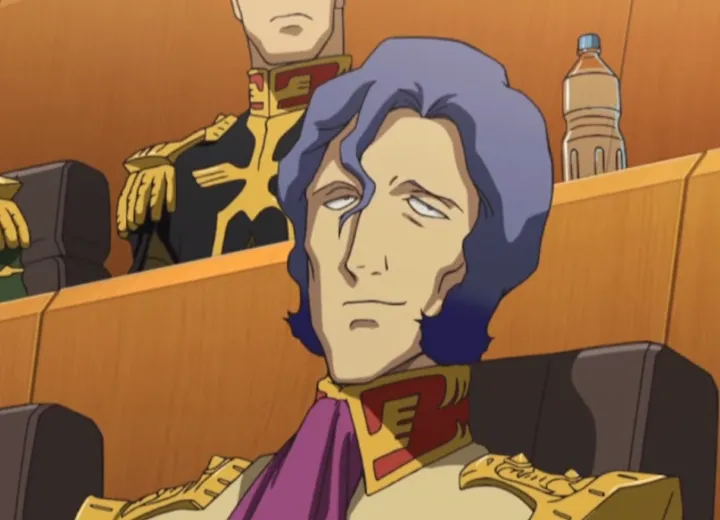Within the vast universe of Mobile Suit Gundam, a saga that has redefined Japanese science fiction since its debut in 1979, there exists a wide range of complex characters who embody the ethical, political, and human dilemmas of war. Among them, M’Quve, an officer of Zeon, stands out not for brute strength or heroic deeds, but for his refinement, strategic vision, and ambiguous morality. This article explores M’Quve’s character in depth—his motivations, symbolism, and his place within the larger conflict between the Earth Federation and the Principality of Zeon.

M’Quve (also stylized as M'Quve) is a commander in the Principality of Zeon's military, appearing in the original Mobile Suit Gundam series (1979), directed by Yoshiyuki Tomino. His character was designed by Yoshikazu Yasuhiko and voiced by Issei Futamata (Japanese) and Michael McConnohie (English).
From his first appearance, M’Quve draws attention for his affected elegance, love of art and porcelain, and his diplomatic tone even in tense military situations. His style and personality contrast sharply with other Zeon commanders such as Dozle Zabi, known for his brutality, or Char Aznable, known for his charisma and personal ambition.
M’Quve oversees mining operations at the Odessa base, which is crucial for securing the rare minerals needed to produce mobile suits and other weaponry. Though his role is administrative and logistical, his political influence is considerable. He is a skilled manipulator who balances competing interests within Zeon while maintaining a diplomatic facade toward the Federation.
One of M’Quve’s most distinctive traits is his love of art, especially ceramics. In several scenes, he is shown tending to porcelain pieces or speaking about objects of artistic value, suggesting a deeper layer to his character: the contrast between cultural beauty and the destruction of war. This duality makes him more than a mere antagonist—he becomes a symbol of the irony of civilization in times of conflict.
Honor, Strategy, and Defeat
The Battle of Odessa is a key turning point in the first half of Mobile Suit Gundam. It is a massive confrontation between the Federation’s ground forces and Zeon troops stationed in Eastern Europe. Victory or defeat in Odessa would determine both sides' capacity to sustain their war efforts.
As commander of this region, M’Quve attempts to halt the Federation's advance through attrition tactics, diplomatic stalling, and, ultimately, by proposing extreme measures such as deploying a nuclear bomb. His suggestion to use a weapon of mass destruction is rejected by his superior, Kycilia Zabi, revealing an interesting contrast in priorities within Zeon’s leadership: while Kycilia focuses on political image and legitimacy, M’Quve is willing to do anything to protect his position and the strategic resources under his command.
However, his plans are thwarted by the offensive led by Captain Bright Noa and pilot Amuro Ray, who by that point is already evolving as the pilot of the RX-78-2 Gundam. The defeat at Odessa is not only a military setback for Zeon but also a personal loss for M’Quve, who is forced to retreat.
His narrative climax arrives later when he returns to the battlefield in space, piloting his custom mobile suit: the Gyan, a sleek yet outdated unit reflecting his chivalric aesthetic. The Gyan is equipped with a beam saber and a shield loaded with mines, a design that underscores M’Quve’s obsession with honorable duels and individual combat, in stark contrast to the pragmatic warfare approach of other officers.
In a direct confrontation with Amuro Ray, M’Quve launches a desperate attack. His style is theatrical, almost ceremonial. He tries to challenge the Gundam as if it were a duel between nobles—his final affirmation of cultural identity in the face of the brutal modernity of war. However, the technological and tactical gap is too vast. Amuro, now strengthened by his emerging Newtype abilities, destroys the Gyan with ease.
With his death, M’Quve becomes yet another example of how ancient values, like aristocratic honor and appreciation for the arts, are swept away by the machinery of total war.
A Symbol of Contradiction
M’Quve is not a central character, but his narrative construction is rich in symbolism. He represents the decline of an aristocracy that tries to maintain its refined image even while engaging in atrocities. He reminds us that war not only destroys cities and lives, but also cultures, ideals, and entire ways of life.
He also demonstrates that Zeon is not simply a monolithic evil force. Its leaders are diverse, with differing motivations and worldviews. While figures like Gihren Zabi pursue total domination with near-fascist ideology, others like M’Quve act out of personal interest, cultural preservation, or even a romanticized notion of conflict.
In this sense, M’Quve can be seen as a tragic figure. His desire to preserve art and culture is legitimate, but his involvement in a genocidal war places him on the wrong side of history. His defeat is not merely a military failure, but the symbolic end of a ruling class that no longer has a place in the new order forged by space warfare.
Though he is not one of the most widely remembered characters by the general public, M’Quve has cultivated a base of fans who appreciate his complexity and unique style. He has appeared in various Gundam video games, such as Mobile Suit Gundam: Encounters in Space and Gundam Versus, where his mobile suit, the Gyan, has become a popular playable unit due to its distinctive design.
His presence serves as a reminder of the moral nuance that defines the Mobile Suit Gundam narrative—a series that transcends black-and-white morality to explore the ambiguity of human nature during wartime. Cultured, strategic, and tragic, M’Quve embodies the fundamental contradiction between the beauty of culture and the brutality of war. In his downfall, we see the fate of those who believe they can control war without being consumed by it.


